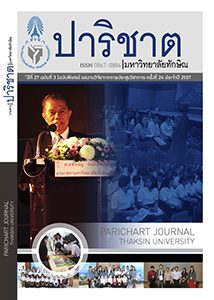The People’s Way of Life in Upper klong Bangkok Noi Community Nonthaburi Province withPhilosophy of To Sufficiency Economy Concept
Main Article Content
Abstract
การแก้ไขวิกฤติการณ์โดยรวมทางหนึ่ง คือการพึ่งพาตนเอง โดยน้อมนำ ปรัชญาของเศรษฐกิจพอเพียง ในพระบาทสมเด็จพระเจ้าอยู่หัวฯ ที่ พระราชทานเป็นแนวทางในการดำเนินชีวิตซึ่งวิถีชีวิตคนในชุมชนริมคลอง บางกอกน้อยตอนบน จังหวัดนนทบุรี มีเสน่ห์ในความเป็นชุมชนดั้งเดิม แต่ กำลังถูกรายล้อมด้วยการเปลี่ยนแปลงด้านต่าง ๆ ดังนั้น การวิจัยครั้งนี้จึงมี วัตถุประสงค์เพื่อศึกษาวิถีชีวิต ด้านเศรษฐกิจ สังคม วัฒนธรรม สิ่งแวดล้อม และศึกษาความสอดคล้องของวิถีชีวิตคนในชุมชนริมคลองบางกอกน้อยตอนบน จังหวัดนนทบุรี ที่สอดคล้องกับแนวคิดปรัชญาของเศรษฐกิจพอเพียง โดยใช้ วิธีสัมภาษณ์ สังเกตจากการมีส่วนร่วมในชุมชนและใช้แบบสอบถาม ผลการ ศึกษาพบว่า 1) วิถีชีวิตของคนในชุมชนริมคลองบางกอกน้อยตอนบน จังหวัด นนทบุรี มีวิถีชีวิตด้านเศรษฐกิจอยู่ในระดับดี ประกอบอาชีพเกษตรกรเป็น อาชีพหลักด้านสังคมช่วยเหลือเกื้อกูลกัน ด้านวัฒนธรรมมีความมั่นคงและ ยืนยาวในประเพณีดั้งเดิม ด้านสิ่งแวดล้อมมีความเป็นธรรมชาติ 2) ความ สอดคล้องของวิถีชีวิตคนในชุมชนริมคลองบางกอกน้อยตอนบน จังหวัดนนทบุรี กับแนวคิดปรัชญาของเศรษฐกิจพอเพียง โดยรวมอยู่ในระดับค่อนข้างสูง มีระดับการปฏิบัติร้อยละ 78.44
The People’s Way of Life in Upper klong Bangkok Noi Community Nonthaburi Province with Philosophy of To Sufficiency Economy Concept
Sumran Juchooy
TKing Bhumibol Adulyadej’s Sufficiency Economy Policy is one of the best way for solving crises in Thailand . A way of life of people living in upper Klong Bangkok Noi community, based on self reliance, patience, perseverance, wisdom and prudence is rapidly changed by socioeconomic, environmental and cultural.This research aims to study the economic, social, cultural and environmental life of the people living in upper Klong Bangkok Noi community and to study the practice of philosophy of Sufficience Economy in their living . From the study we found that. 1) Economic lives of the people were at good level. Agriculture is the main occupation of the community. Socially, they are supportive and helpful. Cultusally, they firmly preserve their own traditional culture. Environmentally, they still maintain natural environment. 2) Also we found that overall people practice the sufficiency economy in their economic, social, cultural and environmental lives at rather high level (78.44%)


